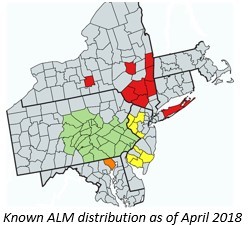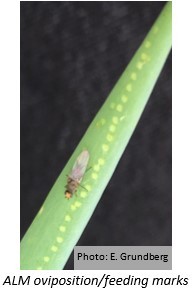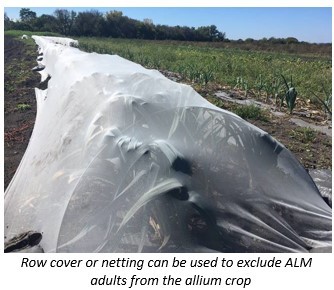Allium Leafminer Active in Southern Pennsylvania
Teresa Rusinek, Vegetable Specialist
Eastern New York Commercial Horticulture
A new invasive insect pest in the Northeast known as the Allium leafminer (ALM), Phytomyza gymnostoma, damages crops in the Allium genus (e.g., onion, garlic, leek, scallions, shallots, and chives) and is considered a major economic threat to Allium growers. Originally from Europe, ALM was first detected in Lancaster County, Pennsylvania in December of 2015 and in New Jersey and New York in 2016. As of fall 2017, ALM activity has been confirmed throughout eastern Pennsylvania, New Jersey, Delaware, southeastern New York as well as Tompkins and Suffolk counties.

ALM is currently active in Lancaster, PA where the first signs of adult fly emergence were detected on April 13, 2018. Based on our observations from last spring in the Hudson Valley, we expect emergence in our area in the next week or so. ALM will continue to emerge, feed and lay eggs in alliums over about 4 weeks. Leaf mining from larvae will begin to show up within two weeks after first adult emergence and intensify over the duration of the flight. The larvae mine their way toward the base of the allium plant where they will pupate.

Growers who have alliums with green tissue growing in the field or in high tunnels now in southeastern New York should consider protective measures soon, especially in Orange, Ulster, Dutchess, Columbia, Sullivan, and Schoharie counties where significant infestations were observed last year. If you have small plantings that can be covered with row cover to exclude emerging ALM flies, now is the time to do so as long as you didn't have infested alliums (including wild onion grass) in the same space last season. Growers with larger plantings may consider applications of insecticides if and when significant ALM activity is observed in the allium crop. There are both organic and conventional insecticides labeled for allium crops to control this type of leafminer. Insecticide efficacy tests are currently being conducted in both New York and Pennsylvania. It is important to carefully observe your allium crops over the next few weeks. ALM oviposition/feeding may initially be observed along field edges. Be vigilant and please call or email either Teresa Rusinek at 845 389-3562, tr28@cornell.edu or Ethan Grundberg at 617 455-1893, eg572@cornell.edu if you see evidence of ALM feeding or have any questions about management.


Upcoming Events
I thought I was covered for that! Farm Insurance Webinar Series, Jan-Feb 2026
January 13, 2026 : Session 1: Insurance and Risk Management 101
Insurance and Risk Management 101. This first webinar will cover many of the general provisions found in insurance policies and describe some of the terms to be aware of when you are considering your options. Steve Hadcock, Capital District Hort Team and Greg Murk, FarmNet.
January 20, 2026 : Session 2: Liability Insurance
Coverage for the risk that your business will cause harm to someone. Are you having people on your farm or selling a food product? You might need liability insurance. Robert Hadad, Cornell Vegetable Program, Elizabeth Higgins, Eastern NY Commercial Hort Program.
January 27, 2026 : Session 3:Protecting Yourself from Disasters (Crop Insurance, USDA FSA programs and Flood Insurance)
Are you protected from a weather event on your farm? Learn about your options for Disaster Coverage (crop insurance, FSA programs, flood insurance). Elizabeth Higgins, Eastern NY Commercial Hort Program.
February 3, 2026 : Session 4: Insuring People (health, life and disability insurance)
Options for health insurance, life insurance and disability insurance, and how they can help farmers and their employees. Maire Ullrich, CCE Orange County and Lucas Smith, Cornell Ag Workforce Development
February 10, 2026 : Session 5: Property Insurance
Insuring your infrastructure, equipment, and livestock from loss. Learn about the types of coverage, and the risks they reduce. Colin Hostetter, Tri-County Ag Team, Desiree Keever, CCE Delaware County and Steve Glick, Kevin Daniels Agency.
How to Diversify or Scale Up with Confidence for Profitability - Inspired by Annie's Project
February 4, 2026
February 11, 2026
February 25, 2026
Do you have an idea for a new enterprise to add value to your farm? Maybe you're considering scaling up for a potential market opportunity but just aren't sure if it's a good fit for your business. Join Cornell Cooperative Extensions of Allegany County, Broome County, Madison County, Onondaga County, Niagara County, Tioga County, the Niagara Small Business Development Center, and the Eastern NY Commercial Horticulture Team for a hybrid series on Wednesdays in February, starting on February 4th that will answer these questions and more. Annie's Project seeks to empower farm women through education, networks and resources. We welcome, and encourage, learning and sharing amongst farm women as we help you grow as decision-makers and leaders on your farm.
2026 Northeast Extension Fruit Consortium Winter Webinar Series
February 4, 2026 : Management of Up and Coming Strawberry Diseases in the Northeastern United States
Session 1: Management of Up and Coming Strawberry Diseases in the Northeastern United States
February 11, 2026 : Kiwiberry Production in the Northeast
Session 2: Kiwiberry Production in the Northeast
February 18, 2026 : Heat Mitigation- Sunburn and Fruit Coloring
Session 3: Heat Mitigation- Sunburn and Fruit Coloring
February 25, 2026 : The Dating Game- Updates in Lepidopteran Mating Disruption
Session 4: The Dating Game- Updates in Lepidopteran Mating Disruption
March 4, 2026 : USEPA Endangered Species Act Strategies and Pesticide Use
Session 5: USEPA Endangered Species Act Strategies and Pesticide Use
March 11, 2026 : Practical Drought Management for Fruit Growers
Session 6: Practical Drought Management for Fruit Growers












































